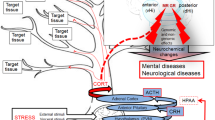Abstract
Hippocampus plays a crucial role in learning and memory and, in spite of its remarkable plasticity, it is also particularly sensitive to stress hormones due to its high concentration of corticosteroid receptors. Indeed, adrenal steroids modulate hippocampal plasticity, acting on excitability and long term potentiation or depression. By a chronobiological approach, we studied the cortisol and DHEAS secretion in clinically healthy old subjects and in age- matched demented patients, including both the degenerative and the vascular type. When compared to young controls, both clinically healthy elderly subjects and demented patients, particularly those with AD, had significantly higher cortisol levels at night time, i.e. at the moment of the maximal sensitivity of HPA axis to stimulatory or inhibitory inputs. At the same time, a clear age- and disease- dependent reduction of DHEAS secretion was found. Thus the cortisol to DHEAS molar ratio was significantly higher in healthy old subjects, and even more in demented patients, when compared to young controls, and significantly linked to both age and cognitive impairment. Finally, the quantitative and qualitative changes of the adrenal secretory pattern were significantly correlated with the decline of hippocampal volumes, measured by MRI. In conclusion, several lines of evidence deal with a pathogenetic role of stress hormones in the occurrence and progression of cognitive disorders in elderly subjects. The consequent hippocampal neuronal impairment may in turn be responsible for the continuous activation of HPA axis and the increased hypothalamic expression of vaso-pressin and corticotropin releasing hormone.
Similar content being viewed by others
References
McEwen BS. The neurobiology of stress: from serendipity to clinical relevance. Brain Res 2000; 886: 171–89.
De Kloet ER. Brain corticosteroid receptor balance and homeostatic control. Frontiers Neuroendocrinol 1991; 12: 95–164.
Lupien SJ, McEwen BS. The acute effects of corticosteroids on cognition: integration of animal and human model studies. Brain Res Rev 1997; 24: 1–27.
Meyer J. Biochemical effects of corticosteroids on neural tissues. Physiol Rev 1985; 65: 946–1020.
Orchinik M, McEwen BS. Rapid steroid actions in the brain: a critique of genomic and nongenomic mechanisms. In Wehling M, ed. Genomic and non-genomic effects of aldosterone. Boca Raton, Florida: CRC Press, 1995: 77–169.
Sapolsky RM. Glucocorticoids, stress, and their adverse neurological effects: relevance to aging. Exp Gerontol 1999; 34: 721–32.
Belanger A, Candas B, Dupont A, et al. Changes in serum concentrations of conjugated and unconjugated steroids in 40- to 80-year-old men. J Clin Endocrinol Metab 1994; 79: 1086–90.
Roberts E, Bologa L, Flood JF, Smith GE. Effects of dehy-droepiandrosterone and its sulphate on brain tissues in culture and on memory in mice. Brain Res 1987; 406: 357–62.
Ferrari E, Cravello L, Muzzoni B, et al. Age-related changes of the adrenal secretory pattern: possible role in pathological brain aging. Eur J Endocrinol 2001; 144: 319–29.
Pomara N, Greenberg WM, Brandford MD, Doraiswamy PM. Therapeutic implications of PHA axis abnormalities in Alzheimer’s Disease: review and update. Psychopharmacology Bull 2003; 37: 120–34.
Magri F, Terenzi F, Ricciardi T, et al. Association between changes in adrenal secretion and cerebral morphometric correlates in normal aging and senile dementia. Dement Geriatr Cogn Disord 2000; 11: 90–9.
Sapolsky RM, Krey LC, McEwen BS. Prolonged glucocorticoid exposure reduces hyppocampal neuron number: implications for aging. J Neurosci 1985; 5: 1222–7.
Bodnoff SR, Humphrey AG, Lehman JC, et al. Enduring effects of chronic corticosterone treatment on spatial learning, synaptic plasticity, and hippocampal neuropathology in young and middle-aged rats. J Neurosci 1995; 15: 61–9.
Leverenz JB, Wilkinson CW, Wamble M, et al. Effect of chronic high-dose exogenous cortisol on hippocampal neuron number in aged nonhuman primates. J Neurosci 1999; 19: 2356–61.
Kulstad JJ, McMillan PJ, Leverenz JB, et al. Effects of chronic glucocorticoid administration on insulin-degrading enzyme and amyloid-beta peptide in the aged macaque. J Neuropathol Exp Neurol 2005: 64: 139–46.
Bye N, Zieba M, Wreford NG, Nichols NR. Resistance of the dentate gyrus to induced apoptosis during ageing is associated with increases in transforming growth factor-β1 messenger RNA. Neuroscience 2001; 105: 853–62.
Pomara N, Doraiswamy PM, Tum H, Ferris S. Mifepristone (RU486) for Alzheimer’s disease. Neurology 2002; 58: 1436–7.
Author information
Authors and Affiliations
Corresponding author
Additional information
This work was presented at the “International Meeting — The Aging People”, Pavia, 2–4 September 2004
Rights and permissions
About this article
Cite this article
Magri, F., Cravello, L., Barili, L. et al. Stress and dementia: the role of the hypothalamic-pituitary-adrenal axis. Aging Clin Exp Res 18, 167–170 (2006). https://doi.org/10.1007/BF03327435
Received:
Accepted:
Published:
Issue Date:
DOI: https://doi.org/10.1007/BF03327435




